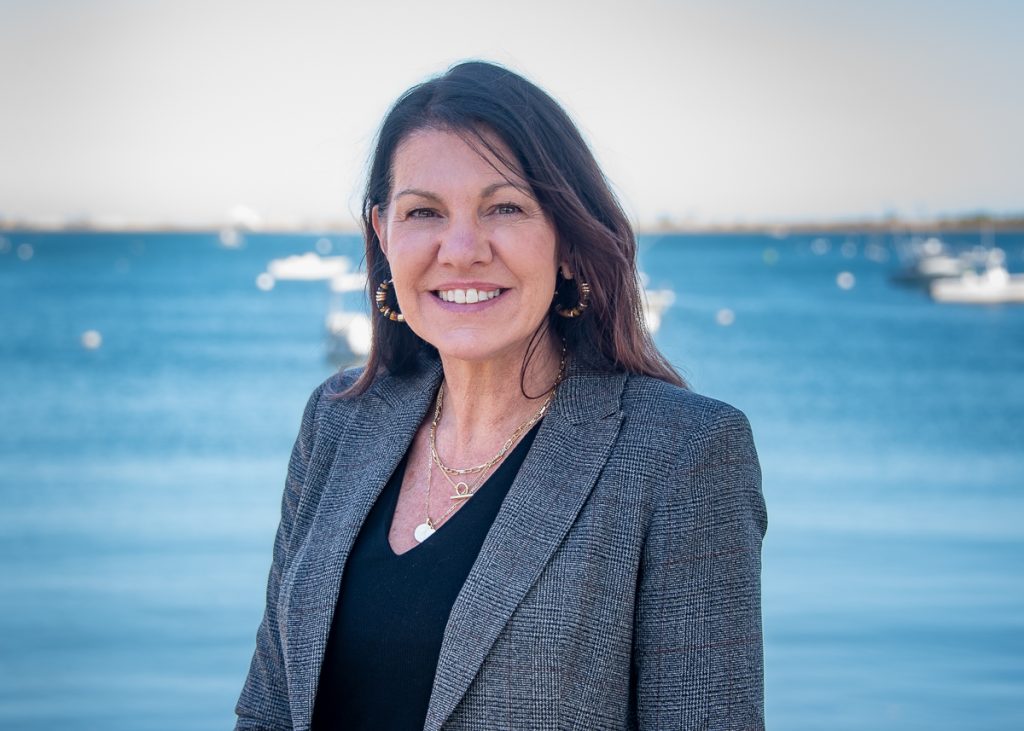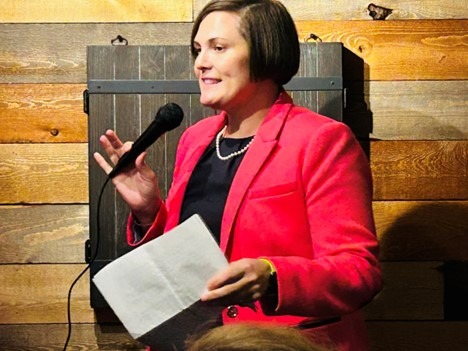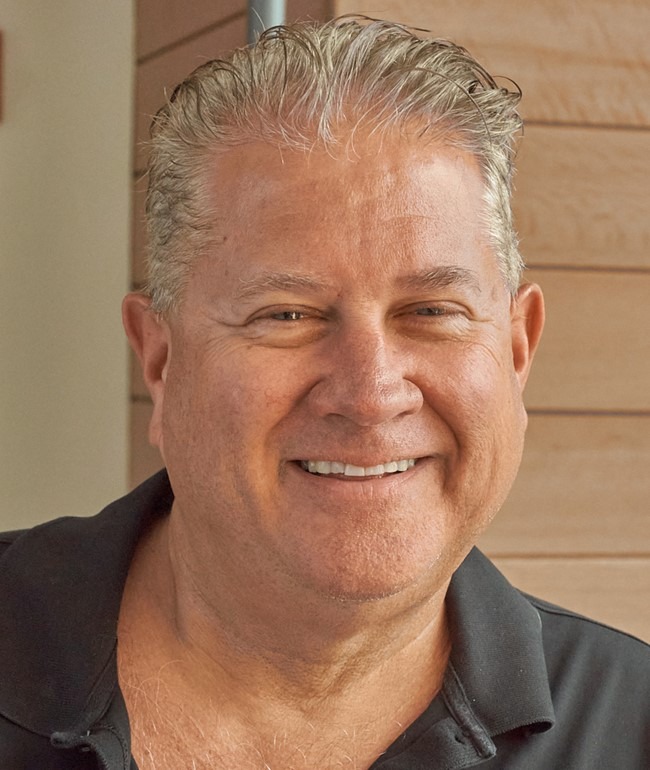Editor’s note: To help voters make informed choices in the Nov. 5 general election, the Plymouth Independent reached out to the candidates seeking to represent Plymouth in the state House of Representatives and Senate.
For more information on how to cast a ballot, go here. For more information on the five binding state ballot questions, go here.
State representative, 12th Plymouth district

On a recent afternoon, Republican candidate Eric Meschino and his son, Robin, were hoisting crates of lobsters from his boat to his pickup truck on a dock in Hull. He lives in Plymouth, but fishes out of Hull, where he grew up. His whole life, he said, he wanted to be a lobsterman.
He had no ambition to seek office until a couple of years ago – Meschino ran for state representative, losing to Democratic incumbent Kathleen LaNatra. He says he was motivated by the burdensome government regulations on lobstermen aimed at protecting right whales. This year, he’s facing off against LaNatra again.
“I started seeing regulations that seemingly made no sense to me,” Meschino said. “They know it’s not this fleet that killing these whales.”
As an example, he pointed to his line, 7/16 of an inch thick. Most lines found around entangled whales, he said, are twice as thick. In addition, he said, those lines float, whereas his lines sink.
“We’re the low-hanging fruit,” he said of fishermen. “We don’t have a lot of money to defend ourselves.”
The National Oceanic and Atmospheric Administration has associated some lines found around entangled right whales with their deaths.
“I generally believe these people have the best of intentions,” he said of advocates for whales. “They’re trying to do the right thing, but they’re misguided in who they’re going after.”
As a result, he said, large areas of ocean are off limits to lobstermen. Unless he goes out to Stellwagen Bank in winter, he said, he must have all his gear out of the water by Feb. 1 and cannot go back until May 16.
“This is America, right?” he said. “You just work as hard as you want to live the life you want, but now I can’t even go to work.”
Meschino, 53, wants to go to Beacon Hill so that his voice can be heard on what he considers fishing overregulation but also on other issues, such as driver’s licenses for undocumented immigrants, the millionaires tax – it’s hurting small businesses, he said – and over-taxation in general.
The 12th district includes downtown Plymouth, North Plymouth, and parts of West Plymouth as well as Kingston, Plympton, and parts of Halifax, Middleborough, and Pembroke.
Meschino grew up lobstering with his father. He put himself through junior and senior years at Boston College High School and went on to Boston University before dropping out after two years. He got a job on an offshore fishing boat, the Hannah Bowden, captained by Linda Greenlaw. After a few trips, he decided offshore fishing was not for him, and went back to school, then Wall Street and Philadelphia, before coming home to New England, fishing offshore for a few years until his father retired and he took over the lobster boat.

Kathleen LaNatra said that when she knocks on doors in Plymouth, voters bring up Holtec – the company decommissioning the Pilgrim nuclear power plant site – immigration, the shortage of primary care doctors, and the inability of older residents to downsize their homes because they cannot find smaller ones that are affordable.
To address the financial burden of providing housing and other services to immigrants, LaNatra said, more adjustments must be made to the state’s right-to-shelter law for homeless families. The Legislature has already limited families to a stay of nine consecutive months in the Emergency Assistance Family Shelter program.
“We need to look further into making more reforms,” she said. “We want to be humanitarian, but it’s not sustainable.”
On the shortage of primary care doctors, LaNatra said she and colleagues are considering legislation that would encourage more people to enter the field by alleviating the cost of college and medical school. She said she has also filed legislation to speed up licensing for mental health counselors.
Regarding housing, LaNatra pointed to the passage of the Affordable Homes Act, which recognizes the right of homeowners statewide to build accessory dwelling units on their property.
Legislators also secure funds for specific needs for their districts. For example, LaNatra noted, she helped secure $25,000 for the Plymouth Downtown Waterfront District, which used the money for flowers for parklets during outdoor dining season.
“When we do the budget session, we are able to attend earmarks for our district,” said LaNatra, who serves on the powerful Ways and Means Committee. “You’re not guaranteed that by any means. You need to go in front of the chair and in front of your colleagues and advocate for those funds.”
Beside the money for the Downtown Waterfront District, LaNatra said she was able to secure funds for the Plymouth Area Chamber of Commerce’s One Fund, which supported small businesses during the pandemic. Working with State Sen. Susan Moran, a Falmouth Democrat who is running for Barnstable County Court Clerk of Courts, and State Rep. Mathew Muratore, a Republican running for Moran’s seat, she also obtained $150,000 to study the feasibility of a convention center.
“It’s not like the federal government,” she said. “We actually do get along and we want the best for our district, and we all work really well to see what those needs are and work together.”
LaNatra supports a convention center in downtown Plymouth, which she said would help small businesses during the week, between the weekend tourist crowds.
State representative, 1st Plymouth district

As he knocks on doors in Plymouth, Republican Jesse Brown said he hears about the same issues over and over: The cost of food, gas, utilities, housing, and taxes.
“They’re struggling out there, and they want relief,” Brown said of residents.
Brown, 46, is vying for Plymouth’s other state representative seat, the 1st Plymouth, which encompasses all of Plymouth except for downtown, North Plymouth, and parts of West Plymouth. (Muratore, the current representative, is running for state Senate.)
Brown, a cellular technology entrepreneur and former Marine, said the Legislature can help with the cost of living by cutting the sales tax from 6.25 percent to 5 percent, as well as lowering the gasoline and diesel tax, which is now 24 cents a gallon.
“If you decrease those costs, especially in shipping, which is the gasoline tax and the diesel tax, it will drop the prices in the supermarket for people,” he said.
But what he is most invested in, Brown said, is veterans’ issues. (He founded Heidrea for Heroes, a nonprofit that assists veterans.) For example, he would, like to increase the property tax exemption for veterans. The state HERO act signed into law this year allows towns to double the exemption. Currently, Plymouth’s exemption is $400, Brown said. He said he is particularly interested in increasing the exemption for veterans 65 and older.
“So they can stay in their homes,” Brown said.
Derek Brindisi, Plymouth’s town manager, said the town is close to making a decision on whether to double the exemption, but must consider its impact on the budget. He estimated that the current exemption represents $460,000 in lost revenue to the town and that a doubling would bring that to $928,000 in uncollected revenue.
If elected, Brown said, he would like to serve on the Joint Committee on Veterans and Federal Affairs.
He also wants to address the migrant crisis by amending the right-to-shelter law, repealing funding for emergency housing for homeless migrants, and repealing the law granting undocumented immigrants a driver’s license.
Brown said he would advocate for law enforcement and other first responders, including by adding more funding for education.
“We really need to strengthen their recruitment and their retention,” he said. “They need strong advocates up at the State House.”
He cites endorsements from the State Police Association of Massachusetts, the Massachusetts Coalition of Police, and the Massachusetts Fraternal Order of Police.

For Brown’s Democratic opponent Michelle Badger, who grew up in Plymouth, visiting with prospective voters has led to a rediscovery of her hometown.
“It’s been really fun to knock on all those 6,000 doors and to be down dirt roads I didn’t know were exactly there, and to see beautiful ponds,” Badger said. “The things I’ve seen are just gorgeous.”
During that process, Badger said, she learned that the cost of housing is the residents’ top priority.
Like LaNatra and Brown, Badger, 40, cites the $5.16 billion Affordable Homes Act signed earlier this year as a big step towards making housing less expensive. Besides allowing people statewide to build affordable housing units on their property, the law provides tax credits to developers who build affordable housing.
The main reason housing is so costly, Badger said, is that construction has not kept pace with population growth.
Badger, who chairs the Plymouth School Committee, intends to pursue getting more resources for Plymouth schools if elected to a seat on Beacon Hill. Because the town is the largest municipality geographically in the state, the schools spend $11 million a year on transportation. Badger and the rest of the School Committee, along with school superintendent Christopher Campbell, have been working with legislators to defray transportation costs for Plymouth and 32 other spread-out communities that spend at least 125 percent of the state average on school transportation.
“I really understand what it means to have local and state governments working together,” she said.
Another challenge, Badger said, is the cost of minivan hires for some special education and homeless students. Van trips can cost between $250 and $800 a day per child, she said.
“Every time I see one, I wonder how much we paid for that van today,” she said. “There’s not a lot of competition, so they can essentially charge you whatever they want.”
Plymouth schools have been working with the state’s Department of Elementary and Secondary Education to come up with a formula to standardize how much van owners can charge.
Badger opposes making students pass MCAS – the Massachusetts Comprehensive Assessment System – before they can receive a high school diploma. Massachusetts voters will decide – through ballot question 2 – whether it will remain as a graduation requirement.
She is also pledging to work to restore $100,000 in the state budget for the tourism organization See Plymouth that was taken out of the state budget this year.
“Being able to get more money back here is really going to help us because tourism is one of our biggest drivers of our economy,” said Badger.
Badger said that, if elected, she wants to serve on the Committee on Tourism, Arts and Cultural Development.
She promises that working on Beacon Hill would be her full-time job.
State senator, Plymouth and Barnstable district

Republican state Rep. Mathew Muratore said he keeps hearing from residents that immigration, the cost of housing and groceries, and the need for a balance of power and transparency in state government are the most important issues in the election.
Muratore is running against State Rep. Dylan Fernandes, a Falmouth Democrat, for the seat vacated by Sen. Susan Moran, who is running for Barnstable County Clerk of Courts. The district includes Plymouth, Falmouth, Kingston, Pembroke, Plympton, Sandwich, Mashpee, and Bourne.
Muratore, 63, defeated his rival in the Republican primary, Bourne School Committee member Kari Macrae, by just 39 votes. Macrae sued six towns, including Plymouth, alleging that state officials failed to follow state rules to verify the identity of early voters. She asked the courts to order a new primary election or to allow Republican town committees to select a nominee, to declare the Nov. 5 general election between Muratore and Fernandes null and void, and to order a special general election after Nov. 5. Two courts have turned down her request for an emergency review of the primary votes. She did not respond to a request for comment.
Muratore is a founding partner of EF Senior Care. Patrick Flaherty, another founding partner, is a Plymouth Independent board member.
Muratore said revising Massachusetts’s right-to-shelter law is a priority.
“People are coming into Massachusetts from wherever and we’re required to give them shelter,” he said. He would like to see a residency requirement of at least three, six, or nine months before people can qualify for shelter assistance. He also wants to reduce funding for sheltering newcomers. He believes those measures would deter people from coming to Massachusetts.
“It’s not about the people at all,” Muratore said. “It’s a humanitarian issue and we understand why people want to come to the U.S. It’s more around the affordability of it, what it’s costing us.”
On transparency, he supports ballot question one, which would authorize the state auditor to audit the legislature.
“People need to have trust in government,” he said.
He pointed to the fact that conference committees – through which senators and representatives resolve differences between House and Senate versions of a bill – are closed, as are some votes in committee, so that voters do not know how their legislators vote on some issues.
“It’s up to each committee if they want to have it public or not,” Muratore said.
That lack of transparency has led to widespread support for question one.
To alleviate the high cost of living, Muratore proposes a tax cut like the $1 billion reduction taxpayers received in 2023.
“There’s room to cut another billion dollars or more to help out small businesses,” he said. “They employ so many people.”
He suggests that the funds could come from cuts in sheltering migrants and from the millionaires’ tax, a 4 percent surtax on annual income above $1 million that collected more than $2 billion in fiscal year 2024, which ended June 30.
“We know there’s money there that we can actually do a significant [tax] cut,” Muratore said.
He, too, believes that the Affordable Homes Act will help ease the cost of housing. Muratore voted for the House version of the bill in June. Then, at 4:30 a.m. on Aug. 1, he said, legislators were told they would be voting on the conference committee bill resolving differences between the House and Senate versions. Muratore said they were asked to vote without reading the bill, and so he voted against it. After later reading it, Muratore said, he now supports the law.
He has served in the House since 2015.

Democrat Dylan Fernandes touts his own experience in the House, where he has served since 2017.
Fernandes, 34, argues that he would offer constituents greater clout than Muratore could.
“If you’re in the majority, you’re automatically made a chair of a committee and you just have significantly more ability to get things done and deliver more for the district,” he said. “That’s really important, because too often Plymouth has been kind of an overlooked place when it comes to getting special legislation passed or bringing back resources.”
In particular, Fernandes said, the next state senator should be a leader on issues of water quality, coastal resilience, and adaptation to sea level rise and climate change. He cited his vice chairmanship of the Committee of the Environment and Natural Resource and pointed to a House resolution he sponsored to add Massachusetts to the Paris climate agreement after then-President Donald Trump pulled the United States out of the accord.
He also cited his support for the Cape and Islands Water Protection Fund, which imposed a 2.75 percent lodging tax that he projects will raise $1 billion to improve water quality on the Cape and islands.
“This is the biggest water quality legislation ever passed, probably, in the region,” said Fernandes. “Beaches have been shut down because of poor water quality, so it’s not just an environmental issue. It’s a huge economic and tourism issue as well.”
He said there is no reason that Plymouth cannot have specific legislation that carves out funding for major challenges specific to it.
“What Plymouth really needs is someone who can actually deliver on that and has the experience and also the political power to do that,” he said.
Fernandes calls education another priority, in particular early education and more funding for school transportation in Plymouth.
“The next step in supporting education at the state level is around expanding and creating a system for universal early education and care,” he said. “And it’s crazy to me that Plymouth doesn’t get reimbursed from the state for busing students even though it is the biggest town in the state.”
Another important issue is the cost of housing, Fernandes said. He, too, cites the Affordable Homes Act passed this year as a major step towards addressing the problem. He said the law not only funds building more housing in general, but also offers rental assistance, housing for veterans, and directs attention to the housing needs of seasonal communities that hire summer workers.
Fernandes supports the Roe Act, which codified the Supreme Court’s Roe v. Wade decision, guaranteeing women the right to an abortion in Massachusetts. He said he worked to obtain funding for Health Imperatives, a health care provider focused on services to low-income people, to offer medication abortion at its Hyannis clinic. Surgical abortions are not available on Cape Cod.
He also touts his opposition to letting Holtec International – the company decommissioning the former Pilgrim nuclear power plant – discharge treated radioactive water into Cape Cod Bay, a position Muratore said he shares.
And Fernandes said it is important for the district to have an advocate for community concerns in Bourne and Plymouth as planning for the replacement of the two bridges over the Cape Cod Canal takes place over the next few years.
Fred Thys can be reached at fred@plymouthindependent.org.

